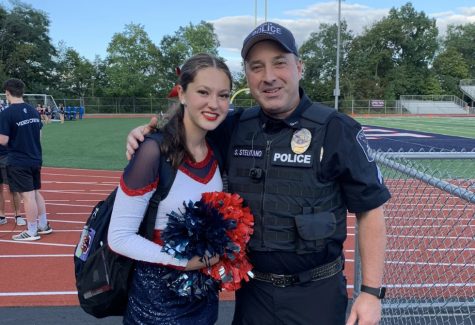True crime stories like “Dahmer: Monster” ignore victims for money

February 8, 2023
Recently, the annual Golden Globes were awarded, recognizing excellence in film and television. Most watchers were satisfied with nominees, others were angry, but not for the reason you might think. Anger arose when actor Evan Peters, who plays serial killer Jeffrey Dahmer, won the award for best actor for his performance in Netflix’s drama series “Dahmer – Monster: The Jeffrey Dahmer Story”.
Shirley Hughes, the mother of Dahmer’s 12th victim, was angered by the nomination and then Peters winning. During an interview with TMZ, she mentioned how Peters should have responded to the award by dedicating a part of it to recognize the victims and their families.
Additionally, Peters’ word choice in his acceptance speech was also criticized when he said he “hoped some good came out of it”. Families felt that nothing good could come out of it for them.
Something I find extremely interesting about the interview is that Hughes told TMZ, “There’s a lot of sick people around the world, and people winning acting roles from playing killers keeps the obsession going and this makes sick people thrive on the fame.”
When “Dahmer – Monster: The Jeffrey Dahmer Story” was first released, controversies began to surface quickly. I could talk about how Halloween costumes based on the murderer were banned on Amazon due to the rise in purchases or how many of catch phrases featured in the show became popular. Maybe I could talk about how fanbases were created and bought/made merchandise with said killer’s face on it. However, I’d rather talk about the consequences of highlighting traumatic events and providing platforms for those who perpetrate them.
What causes the fascination that surrounds serial killers? Why is it that we would much rather watch scenes depicting cannibalism and those gory details over scenes that honor victims or tell their stories? Why are monsters rewarded for devastating communities whilst the communities in which they affect are only rewarded with reliving memories of their traumatic experiences?
To be desensitized enough to be entertained by watching true murder and crime is a disturbing consequence that those in the entertainment business have a hard time acknowledging.
Perhaps it’s because we’re interested in things that scare us. Perhaps it’s interesting to dive into an illicit life we are not used to seeing. To be desensitized enough to be entertained by watching true murder and crime is a disturbing consequence that those in the entertainment business have a hard time acknowledging.
In conventional entertainment, the more screen time that the main character receives, the more the character’s actions are understood through characterization. When that is established, it can be claimed that the viewer has a higher chance of gaining a sense of empathy and connection with the character. That result can be expected when applied to true crime entertainment.
To be more specific, “Dahmer – Monster: The Jeffrey Dahmer Story”, depicts Dahmer’s life and all of Dahmer’s troubles especially in childhood: his mother abandoned his family, he’s a complete social outcast, he doesn’t get enough attention from his father. All obstacles are common experiences that many others went through, currently live through or may eventually experience because they are universal experiences.
By highlighting these issues, viewers run a high chance of feeling sympathy for the character or killer, perhaps even excusing their actions. By letting a role model or an actor play these characters only increases these chances. To treat serial killers as images and characters to be played by actors, who win awards for the role, glorifies the crimes and opens the possibility of justifying said crimes.
Not to mention, it obviously desensitizes the population. The release of the series was big and it did not fail to create trends on social media platforms. A trend on TikTok revealed users complaining that the show was not “gory enough” and some even hoped that they would go further into detail with the mutilation of the victims.
It’s imperative to see the lack of awareness true crime obsessionists hold for difficult images. An article in Newsweek even revealed an online comment that said, “‘When everyone is freaking out about how ‘morbid’ the new Dahmer show is… you’re just bummed they didn’t show the actual morbid parts.’”
So what happens when a community is presented with visual displays of violence regularly as well as the incentive of fame and popularity? Sometimes, a killer is born. The article on Andersonian presented a study in 2018 by Brad J. Bushman that, “demonstrated that media outlets provide a stage for narcissistic individuals to become ‘stars’ through extreme acts of violence, such as mass murders.”
This is through the use of identifying killers and labeling them with an infamous name to never be forgotten. Fame, or infamy, is enough of a reason to commit acts of violence for some. It’s not hard to assume that some might “kill” to have a Netflix series dedicated to their life story, especially if it comes with their name plastered in the title and it becomes the second most viewed English series on the platform.
Sadly, there is no clear solution, but one thing is certain: The families of victims continue to live through tragedy everyday without their loved ones. Making a mini-series centered around someone who destroyed the lives of victims as well as their friends and family for profit is an incredibly cold and selfish thing to do.
Not having enough empathy or regard for others (especially those dealing with grief) to not only fail to communicate with, but give platform to someone who affected their lives is something I think should not be overlooked. Grief already follows those who knew the victims for the rest of their lives, but creating a show that highlights the person responsible for that grief only intensifies it. It’s not hard to imagine that when those families see such images, they are forced to relive some of the worst moments of their lives.
See, to us it’s just a show that can be turned off, but for them it’s a reality they can never turn off. Can you imagine what that feels like?
“We’re all one traumatic event away from the worst day of your life being reduced to your neighbor’s favorite binge show,” Eric Perry, whose cousin Errol Lindsey was killed by Dahmer in 1991, said to the Los Angeles Times in September.











